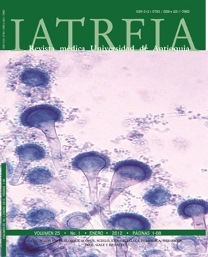Allergic bronchopulmonary aspergillosis, a complication of patients with cystic fibrosis: Report of two cases and review of the literature
DOI:
https://doi.org/10.17533/udea.iatreia.11100Keywords:
Allergic Bronchopulmonary Aspergillosis, Cystic Fibrosis, SteroidsAbstract
Allergic bronchopulmonary aspergillosis (ABPA) is a lung disease resulting from hypersensitivity to Aspergillus, which leads to impaired mucociliary clearance, mucus impaction with obstruction of the airway, and pulmonary infiltration. Clinically it is characterized by dyspnea, wheezing, fever, malaise, brown or black expectoration, and poor clinical response to the standard therapy for exacerbations in patients with chronic lung disease. In patients with cystic fibrosis (CF) it may be difficult to establish the diagnosis of ABPA due to the overlapping of clinical, radiological and immunological features and to the high frequency of pulmonary bacterial infections. Therefore, annual monitoring of these patients is recommended by measuring the level of total immunoglobulin E (IgE); according to its result and to the clinical context, the diagnosis and treatment of ABPA with steroids should be considered. Such treatment leads to improvement of symptoms, lung function, quality of life and prognosis. We report two pediatric patients diagnosed with CF who were difficult to control; the diagnosis of ABPA was established and their pulmonary symptoms improved with the use of steroids.
Downloads
Downloads
Published
How to Cite
Issue
Section
License
Papers published in the journal are available for use under the Creative Commons license, specifically Attribution-NonCommercial-ShareAlike 4.0 International.
The papers must be unpublished and sent exclusively to the Journal Iatreia; the author uploading the contribution is required to submit two fully completed formats: article submission and authorship responsibility.














